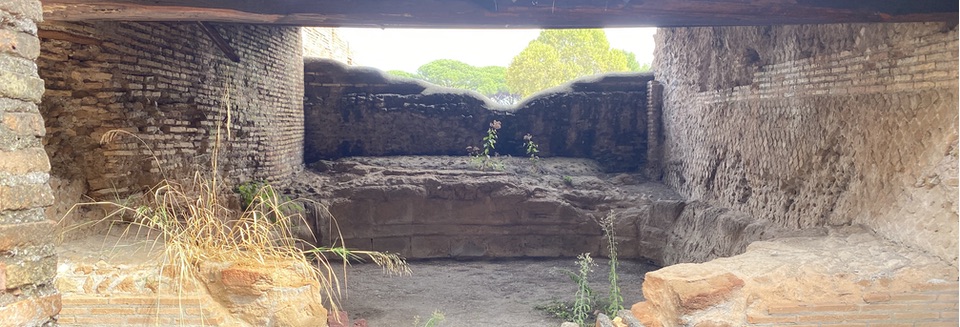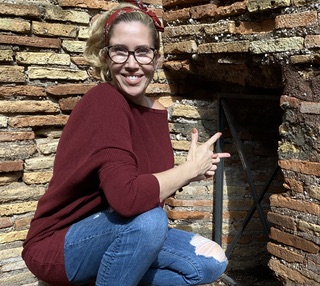
Podcast: Play in new window | Download (Duration: 26:39 — 24.6MB)
Subscribe: Google Podcasts | Spotify | Android | RSS | More

With a real expert, however, things really come to life, so I was absolutely delighted to be able to visit the Mulino di Silvano at Ostia with Farrell Monaco, who has studied, and brought back to life, the canonical bread of Ancient Rome.
She brought the bakery back to life for me. It was a total treat.
Notes
- Farrell Monaco’s website is at Tavola Mediterranea and she’s on Twitter and Instagram too.
- Photos taken by me, on site.
- Additional music by staticpony1, messed about with a bit.
- Yes, there is a transcript.

My visit to Ostia Antica last year, guided by the wonderfully knowledgeable Farrell Monaco, was destined to end in more than a podcast. There was no way I was going to be able to avoid attempting a panis quadratus of my own, and what better time to make the effort than during Fornacalia?
How did it go? You’ll have to head over to my breadsite.
Panis quadratus, an offering to Fornax.
My visit to Ostia Antica last year, guided by the wonderfully knowledgeable Farrell Monaco, was destined to end in more than a podcast. There was no way I was going to be able to avoid attempting a panis quadratus of my own, and what better time to make the effort than during Fornacalia?
This is the festival during which ancient Romans made offerings to the goddess Fornax. She was charged with ensuring that when they parched the wheat, which made it easier to mill, the grain did not burn. I did not go as far as making my own mola salsa, but I had to attempt the bread, using Farrell Monaco’s latest iteration for a particularly festive version with fennel and poppy seeds and fresh parsley.
First attempt at panis quadratus. I was too timid with the demarcations, which almost vanished as a result
I’m not going to go into much detail, because thanks to her research and experiments Farrell’s articles tell you all you need to know and plenty more besides. The dough is actually very easy for a slightly experienced baker. It is quite stiff, about the same as my usual bagel dough, but being 100% wholemeal never quite becomes as smooth and elastic. Its stiffness, in fact, makes me really curious about the kneading machines that we saw in Ostia. Could wooden paddles really have had any impact on a 55% hydration dough of 100% wholemeal flour? I’d love to see a reconstruction in operation.
Anyway, the relatively small amount of leaven means it doesn’t rise very quickly, so on my first attempt I put it in the fridge overnight because I didn’t fancy staying up into the early hours even to please Fornax. The second time, I started much earlier in the day — about 8:00 am — and had a baked loaf by 5:00 pm.
Second attempt ready for baking, with much deeper demarcations.
The tricky part is not the dough but the shaping and handling. The key elements of panis quadratus are the belt around its equator and the divisions pressed into the top to demarcate the sections. Tying the string, of finest Italian hemp, was a little bit fiddly for my fat fingers. And on the first trial, I was much too timid about pressing my reed (bamboo, actually) into the top of the dough. As a result, just as Farrell foretold during our visit to Ostia, the oven spring all but obliterated the marks. The next time I bore down on the bamboo and the marks survived well. And even though mine were the only loaves in my oven, for the finishing touch I did mark them with the bread stamp Farrell sent me.
Second attempt just out of the oven, with the demarcations clear and the bread stamp visible.
As for the taste, it really is rather good. The bread is by no means light and fluffy, but it is not hard to chew either. It is soft, without being fluffy, and the taste of the poppyseeds and especially the fennel, comes through in every bite. I really like it with some well-aged sheep’s milk cheese, although it is also very good with a little butter and honey.
Fornacalia ends tomorrow. I reckon I will be in Fornax’s good graces for another year.
I should add that I edited ruthlessly to fit in a single tweet. The full quote in the transcript, and better yet the words as spoken, make it clear that this was nothing about modern scholarship. But ok.
You didn’t even mention the bisque.
🤦♀️
Pliny is less ambiguous than “nobody.”
Also, did you just yada-yada the Naturalis Historia?
We also write that way, don’t we? Pliny (NH,xx) states that ‘yada yada’…
en.m.wikipedia.org/wiki/Tomb_of_E… this is very visible even today
twitter.com/eatpodcast/sta…
OK. Several of us interpreted that present tense a different way.
And of course I’ve read modern scholarship on the subject. Their books line the walls of my house. My observation was how those people are invisible in ancient Roman documentation and conversation but they’re right there on the bread.
Just to clear this up, I was referring to the literary record… not modern scholarship, when I was saying this. The labourers are represented in archaeology but very scantly in the ancient literary record. They weren’t a frequently covered subject to ancient Roman writers.
Do a bit more research before claiming that nobody has written on a topic or that there’s no historical evidence for it.
press.umich.edu/8224993/trade_…
I mean I have an entire chapter in my book just on bakers and labor but sure ok.
twitter.com/eatpodcast/sta…
The most moving experience I’ve had throughout the research process. ❤️
twitter.com/eatpodcast/sta…
The most moving experience I’ve had throughout the research process. ❤️
These bakery labourers that nobody writes about, nobody talks about … completely invisible in the archaeological record … you see their hands, their fingerprints … there they are … it’s so beautiful.
@TavolaMed transcribed at eatthispodcast.com/ostia
Jeremy and I went down a delightful Roman baking rabbit hole together at Ostia Antica in early October. Have a listen!
twitter.com/eatpodcast/sta…
So good to hear this Jeremy!! Thank you for going down the rabbit hole with me!
We had such a great day out at Ostia Antica, nerding out about ancient Roman KitchenAid machines and much more besides. Thanks so much to @TavolaMed for helping me make sense of the biggest known bakery in the Roman world.
eatthispodcast.com/ostia/